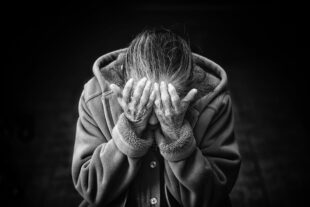Understanding Delayed Grief
Karyn George
Have you ever wondered at a funeral why a family member seems not to be responding in the way people experiencing loss usually do? They could be the ones making sure everyone is taken care of, as they run around making all the arrangements. They seem too composed for what is happening.
 Have you ever experienced deep loss yourself, and in the wake of it, you seem not to react or act in the manner you know you should? If the answer is yes, the explanation could be found in what is called delayed grief.
Have you ever experienced deep loss yourself, and in the wake of it, you seem not to react or act in the manner you know you should? If the answer is yes, the explanation could be found in what is called delayed grief.
Grief is the feeling we experience after deep loss. This can be due to the death of a loved one or the loss of something valuable. After experiencing significant loss, people usually experience and have deep emotional reactions to the loss. However, for some people, this does not happen immediately. This is called delayed grief.
This is when someone does not show or experience the emotions and responses associated with grief. These are the people who will, during the funeral of their loved one, run around attending to all the arrangements without missing a beat or breaking down.
In delayed grief, you are not able to process emotions or confront the reality of what you have lost. The grieving process is either suppressed, suspended, or both. It can be confusing and difficult for those who are watching to see their loved one not showing any sign of dealing with the loss.
What causes delayed grief?
Deep loss can be too painful and overwhelming. To protect itself, the body and mind sometimes give itself time to process what has just happened, hence why some people might not show any emotions immediately. The shock can be too deep. There are, however, many reasons why people experience delayed grief. Below are some examples:
Obligations
Obligations can mean that the person who has experienced a loss cannot take a moment to deal with their loss. These can be funeral arrangements and all the practical things that need to be taken care of. Other life obligations like work, school, and children can also take up so much of someone’s time that they struggle to find a moment to catch up with themselves and reconcile what has just happened.
 Type of loss
Type of loss
Sometimes how our loved ones pass away can contribute to delayed grief. This is especially true in cases where there is some societal shame attached to the type of death. Examples of this are someone passing away as a result of a drug overdose, suicide, death of an abusive partner, or experiencing a miscarriage, just to give a few examples.
Lack of support
For a person to fully grieve, the journey toward healing and begin to accept the loss, they need the love and support of loved ones. When that is not available, they might not feel safe enough to confront their emotions and grief for fear of not being able to keep it together after they do. They have no safe buffer to help gather themselves together if they break down, so they would rather suppress it all.
Unresolved emotions
Delayed grief sometimes is a result of having unresolved emotions with the person who has passed on. An example could be the death of an estranged parent. Those unresolved emotions that existed while they were alive can hinder the ability to grieve for them properly.
Trauma
If a loss is sudden and unexpected, the shock can be too overwhelming for individuals to process their emotions immediately. They will still need time to come to terms with the loss itself and this might only happen after all the proceedings are done and they are confronted by that person’s absence.
Compounded loses
Delayed grief can sometimes be a result of someone experiencing multiple losses in a short space of time. This was especially true during the COVID-19 pandemic when people lost family members so close together and it was difficult to process all that loss at once to cope. Their unresolved grief of another loss influences their ability to grieve in the present.
 Societal norms and expectations
Societal norms and expectations
Grief, like any other human experience, is governed by cultural norms and expectations. An example is that in most cultures, men are expected to show strength by appearing strong and composed even in the face of deep loss. This expectation makes it difficult for them to fully grieve in the present and their grief might surface weeks, months, or even years later.
Personality influences
Our personality influences how we experience and react to the world. When it comes to grief, due to personality, a person might struggle to show emotions in public or right away as some people take time to process painful and traumatic situations.
What are the symptoms of delayed grief?
Delayed grief shows up differently in people. There are some symptoms to look out for, and below are some examples:
- Emotional numbness.
- Denial.
- Feeling stuck and unable to move on after a loss.
- Increased use of alcohol and other substances in an attempt to numb the pain.
- Depression and or anxiety.
- Keeping busy and not wanting to talk about their loss.
- Physical symptoms like digestive issues, headaches, fatigue, and insomnia.
- Avoidance and isolation.
- Changes in appetite.
- Recurring dreams of the person you lost.
- Mood swings and angry outbursts.
- Difficulty concentrating.
- Feeling overwhelmed with simple everyday tasks.
How to cope with delayed grief
Permit yourself to grieve, since everyone experiences grief differently. However, if you are struggling to grieve, it may have a variety of causes. You may stop yourself because you sense that society does not condone the lifestyle the person who passed away lived.
Maybe you have mixed feelings about the person who passed away, and you need to permit yourself to grieve regardless. Grief is grief and to get through it you need to allow yourself to feel the hard emotions first.
Self-compassion is important in the grieving process. This can mean allowing yourself to grieve in whatever way and in whatever timeline. No rule book needs to be followed.
Grief might be a process you do not understand fully. Education can empower you to fully understand what you are going through and navigate your situation more effectively. Reading, researching, and listening to other people who have gone through similar experiences may help.
Avoid unhealthy coping mechanisms. Taking anything or doing anything extreme to numb the pain of loss can be detrimental in the end. Avoid using any substances or alcohol in this difficult season. This can allow the grieving process to start fully.
Seek a grief counselor. There are counselors trained specifically to help people deal with grief. Professional help can be beneficial in that you will be guided and given personalized assistance.
Join a support group. Support groups, especially for people who have suffered a similar loss. can be invaluable when grieving. Being able to talk to people in an open, safe, and understanding environment can be hugely helpful in the healing process.
We are here to support you
If you have recently lost someone or something dear to you and feel stuck in your grief process, please reach out to us. We are here to support you during this season. With a deep knowledge of grief and how it impacts lives, we will be there to give you much-needed support, process your grief, and help you gain healthy coping skills to assist you while you walk through your grief journey.
“Candles on the Water”, Courtesy of Mike Labrum, Unsplash.com, CC0 License; “Raining again…”, Courtesy of Kristina Tripkovic, Unsplash.com, CC0 License; “Lament”, Courtesy of Cristian Newman, Unsplash.com, CC0 License; “For All Those…”, Courtesy of Nick Fewings, Unsplash.com, CC0 License








